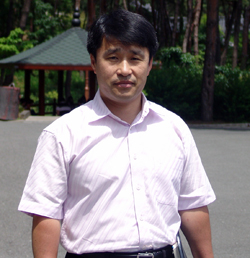
Almost everything about English education in Korea is a mystery. A country where people can’t speak English even though they have learned English at school for at least more than 10 years. A country where people answer in English, “I can't speak English,” when asked, “Can you speak English?” A country where English is a mandatory subject in examinations for entering schools, getting jobs, and promotion, even though it is not an official language. A country where we can find a lot of grammatically wrong and different expressions on road signs in the same city and tourist guidebook. A country, however, where they pour thousands of dollars into learning English, studying abroad, and even attending English kindergartens. A country where, believe it or not, they once had their young children get “tongue operations” to help them pronounce words more like native speakers. And a country where people believe only high scores in English tests can guarantee them a promising future and where people worship a fourth religion, English, and flood into “the church.”
These unusual phenomena stem not only from wrong educational methods but from a distorted enthusiasm for education. I really believe that it is about time that we ascertained whether the English education system has been appropriate, and found out effective ways to teach the language without spending billions of dollars and being driven by stress as we have been doing for decades.
First of all, English in Korea has not been regarded as a language for communication but as one of many subjects for tests. Students need high scores in tests, and the questions in the tests mostly consist of grammar and reading comprehension. Here, the point is that students haven’t had systematic listening lectures and don’t have any opportunities to read aloud and to have their pronunciation corrected. They just “see” sentences like seeing some new curiosity and think over what those sentences they “see” mean. In fact, the most important factors in picking up a language are listening and speaking. In other words, we need to make the most of our ears and mouth. But we haven’t had enough chances to be exposed to listening and speaking environments. As a result, most students can’t figure out the words or sentences they listen to, but ironically they can after “seeing them.” One of the Korean consonants, “ㄱ,” always has the same pronunciation in almost every word, but the English letter “g,” for example, does not sound the same in “gentleman” and in “gospel.” So in learning a foreign language, listening education should be a top priority.
Another irony I need to point out is that in this country the efforts people make to learn English are much bigger than those to learn Korean. For decades, almost every company has required high scores in TOEIC and job interviews. But I think the English bubble, which is what I call it, should be blown off, and the atmosphere and attitude of English-oriented society should be changed. Do people throughout the country, regardless of age, have to learn English and speak it fluently? People should do what they can do best, and the government should encourage them to do so. Every citizen does not have to speak fluent English. Of course, Korea’s unique, wrong education fever, which Barack Obama, the president of America, speaks well of, has played a great role in a positive way, but sometimes not. Also we need to recognize the fact that just speaking a few simple sentences of everyday English does not strengthen our competitive power.
I think, above all things, we should place emphasis on Korean prior to English. We need to encourage students to read a variety of books in kindergarten, elementary, and secondary school education. Even in discussing a certain topic in Korean, not in English, we can’t say anything about the topic unless we have knowledge in that field. Anybody can speak his or her mother tongue, but expressing what they have on their mind is a different matter. But the students on campuses whose interests are in getting high scores and great jobs only try to solve TOEIC questions and to memorize thousands of words only for memorization itself. Accordingly, they can’t improve listening and speaking skills.
Anyone who wants to learn a foreign language needs to know the reason and purpose he or she has to learn it. It is natural that we make some mistakes in speaking a foreign language. So don’t be afraid of making mistakes and, above all, don’t suffer from an obsession with speaking grammatically correct sentences. We can’t get an “A” even in Korean exams. And teachers should tell students about the nature of a language and the most effective ways, not to get high scores but communication skills. Accordingly, the students in Korea, of course, should change their method of learning English. Also it goes without saying that the government should not make exceedingly competitive education environment. Our happiness should not be at the mercy of English and high grades.
Prof. Kim, Tae-young
Dept. of Liberal Education
Dept. of Liberal Education








